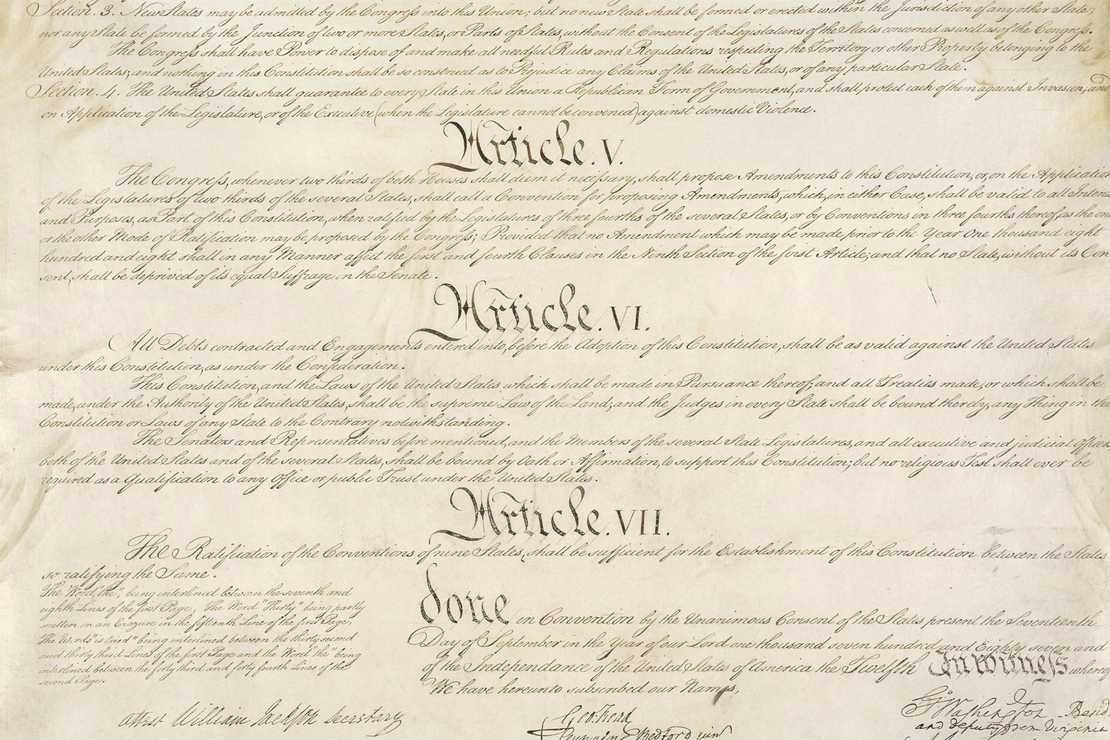
The left’s vile ferocity regarding Dobbs v. Jackson Women’s Health Organization remains unfettered by reality, logic, or morality. The reality is abortion is still available in many states. Logic dictates Roe v Wade was a flawed ruling deserving rejection. Morality states that maybe, just maybe, an unborn child is just that — namely, a child — warranting full protection under the law. However, this is the modern left we’re talking about, so you can safely dismiss any possibility of any or all of these points in action.
Rep. Alexandria Ocasio-Cortez, she of dubious reality grasping skills, and fellow Squad pimples on America’s political face have come up with yet another tack they fervently believe will whisk the Supreme Court away. Why, we’ll invoke the Constitution’s Article III! While it is a given the Squad’s collective Constitutional knowledge is less than their knowledge of how to sail the USS Constitution, this latest move demonstrates the frightening lengths today’s Democrats are contemplating to thwart the designed checks and balances the Constitution’s writers assembled to stop such assaults on a constitutional republic’s proper functioning.
Ocasio-Cortez made her plea to the current Congressional leadership public via Twitter.
With our basic rights under threat from a rogue Supreme Court, Congress needs to exercise our legal authority to the fullest extent. That’s why today we called on @SenSchumer and @SpeakerPelosi to support stripping the Supreme Court’s jurisdiction over abortion. pic.twitter.com/9Rp6RkEqs8
— Rep. Alexandria Ocasio-Cortez (@RepAOC) July 14, 2022
Let’s at least partially set aside the snark and pursue sober analysis.
We start with the usual hysteria about activist judges. Which is a mite strange, coming from the hard left side of the aisle.
We write to urge your support for restricting the Supreme Court’s appellate jurisdiction in the areas of abortion, marriage equality, non-procreative intimacy, and contraception. In doing so, we can ensure that, as Congress takes legislative action to codify each of these fundamental rights, a radical, restless, and newly constituted majority on the Court cannot further undermine the protections we would enact.
The Supreme Court’s devastating decision in Dobbs v. Jackson Women’s Health Organization (2022) is unprecedented. For the first time in our nation’s history, the Court rescinded an individual right recognized by our Constitution. In Planned Parenthood v. Casey (1992), the Supreme Court recognized that “overruling Roe’s central holding would not only reach an unjustifiable result under stare decisis principles but would seriously weaken the Court’s capacity to exercise the judicial power and to function as the Supreme Court of a Nation dedicated to the rule of law.”
Herein lies the first problem. The Supreme Court in Dobbs stated that there is no Constitutional mandate regarding abortion, therefore it is a state-level matter. Quoting from the Dobbs decision:
The Constitution does not confer a right to abortion; Roe and Casey are overruled; and the authority to regulate abortion is returned to the people and their elected representatives.
a) The critical question is whether the Constitution, properly understood, confers a right to obtain an abortion. Casey’s controlling opinion skipped over that question and reaffirmed Roe solely on the basis of stare decisis. A proper application of stare decisis, however, requires an assessment of the strength of the grounds on which Roe was based. The Court therefore turns to the question that the Casey plurality did not consider.
READ RELATED: NY Post Ed. Board: Manhattan DA Alvin Bragg Criminalizes Self-Defense While Treating Criminals as Victims
Skipping ahead a bit:
Guided by the history and tradition that map the essential components of the Nation’s concept of ordered liberty, the Court finds the Fourteenth Amendment clearly does not protect the right to an abortion. Until the latter part of the 20th century, there was no support in American law for a constitutional right to obtain an abortion. No state constitutional provision had recognized such a right. Until a few years before Roe, no federal or state court had recognized such a right. Nor had any scholarly treatise. Indeed, abortion had long been a crime in every single State. At common law, abortion was criminal in at least some stages of pregnancy and was regarded as unlawful and could have very serious consequences at all stages. American law followed the common law until a wave of statutory restrictions in the 1800s expanded criminal liability for abortions. By the time the Fourteenth Amendment was adopted, three-quarters of the States had made abortion a crime at any stage of pregnancy. This consensus endured until the day Roe was decided. Roe either ignored or misstated this history, and Casey declined to reconsider Roe’s faulty historical analysis.
Somehow, I am more inclined to believe a Supreme Court justice’s law interpretation than that of a bartender with an economics degree. But that’s just me.
The letter next breathlessly declares that Congress can and should strip the Supreme Court of its job duties regarding abortion (or whatever else strikes Congress’ fancy) by invoking the Constitution’s Article III.
The House of Representatives already passed the Women’s Health Protection Act (“WHPA”) last fall to codify the constitutional right to abortion, and if this bill becomes law, we can expect that legal challenges will eventually come before the Supreme Court again. Once more, the constitutional right to abortion would be put at risk. We are concerned by the Court’s dismantling of other statutes duly enacted by Congress, including the Voting Rights Act and the Clean Air Act.
The solution is to prevent the Supreme Court from reviewing the constitutionality or legality of the WHPA, which can be done in the next version of the WHPA that we pass this term. Congress’ authority to limit the Court’s jurisdiction is clear. Article III, Section 2 of the Constitution establishes that “the Supreme Court shall have appellate Jurisdiction, both as to law and fact, with such Exceptions, and under such Regulations as the Congress shall make.” Alongside the WHPA, similar provisions must be included in our bills that seek to codify Americans’ fundamental rights to marriage equality, non-procreative intimacy, and contraception.
First, marriage equality, non-procreative intimacy (translation: kill the kid before it ruins the next date night!), and contraception are not “fundamental rights.” The Constitution does not mention them no matter how hard someone tries to read into the Constitution what they wish to see. Therefore, they fall under the Tenth Amendment’s jurisdiction: “The powers not delegated to the United States by the Constitution, nor prohibited by it to the States, are reserved to the States respectively, or to the people.”
John Harrison commented on this notion a few years ago in the University of Chicago Law Review:
According to the traditional understanding of Article III, Congress enjoys substantial power over the jurisdiction of the federal courts. Its authority over the inferior federal courts is, considered in itself, as plenary as the commerce power. Congress may give them all the jurisdiction the Constitution permits, or none at all, or anything in between, as far as Article III is concerned. Other constitutional limitations, when applicable, restrict that power as they may restrict any power of Congress. As for the Supreme Court, Congress may not add to or subtract from its original jurisdiction, although it may, within the limits of Article III, create concurrent jurisdiction in the inferior federal courts. The congressional power to make exceptions from the Court’s appellate jurisdiction is, in itself, limited only insofar as some limitations might be so large as no longer to constitute exceptions. Once again, the exceptions power is subject to any external constitutional limitations that may apply.
In short, the Squad is on very shaky ground here.
It is utterly unsurprising that Ocasio-Cortez and cohorts have concocted this naked power trap to suit their satanic plans. While this doesn’t stand a chance of getting through even the House, let alone the Senate, it stands as a stark warning that modern liberalism is as drunk on the notion of seizing all power to itself as it is intent on murdering children.
Source:






